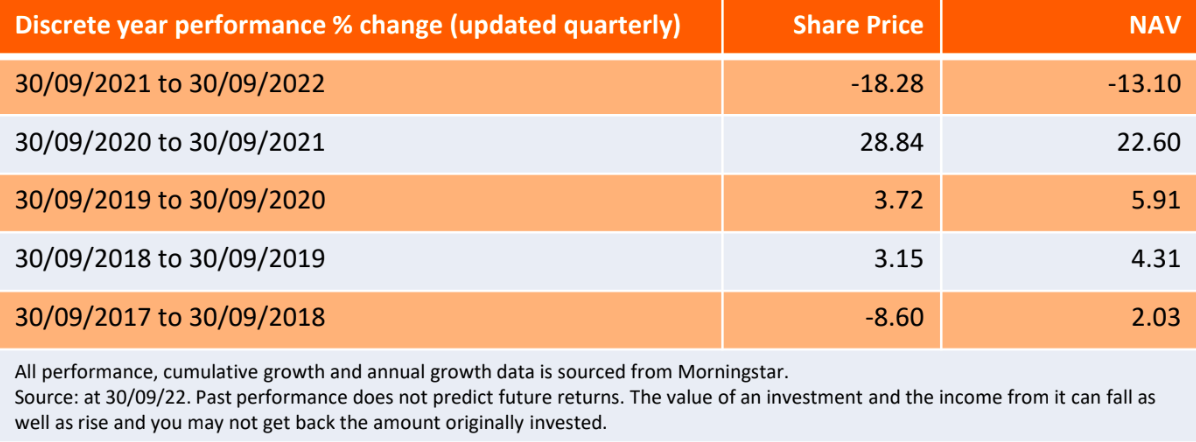
Please Note
From January, the Henderson European Focus Trust’s Commentary will be merged into the Factsheet. The new, and improved, merged Factsheet document will still be accessible via the ‘Quicklinks’ and ‘Documents’ sections on Henderson European Focus Trust’s webpage.
Investment environment
After a bumpy start to the month, European equity indices rebounded in October with the MSCI Europe Index up 6.2%. This has caused us to ponder whether the lows have passed or whether it is a violent ‘bear market rally’. A challenging economic environment, confirmed by purchasing managers’ indices (PMIs) across regions being well below 50, might suggest the latter. However, while recession risk continued to grow, the market knows this and indeed, seemingly discounts it. Further, there are factors that could cushion any downturn, such as the US labour market remaining tight, European governments continuing to support consumers with their energy bills, and global supply-chain constraints easing.
Investors’ obsession with central bank actions and commentary showed no sign of dissipating and continued focus remained on when a ‘pause’ or ‘pivot’ in the interest rate hiking cycle will occur. Disappointingly for some, the European Central Bank (ECB) announced another sizeable rate hike of 75 basis points and the US Federal Reserve followed suit just after month-end. Both gave no clear indication as to when the end point would be reached and reiterated their commitment to fight inflation at all costs. This induced government bond yields to print new cycle highs, with 10-year yields reaching 4.2% and 2.4% in the US and Germany, respectively, before falling back slightly towards the end of the month. We believe the investment zeitgeist –inflation and the price of money –has changed and with it the parameters for valuing companies.
Portfolio review
Barring any systemic financial accident, we continue to believe that at current levels, European equities are pricing in a ‘normal’ recession and that valuations are attractive. Consequently, we have been adding to holdings where we believe share prices have troughed. These included Arkema, Holcim and Solvay. We also further increased the portfolio’s exposure to semiconductor names by initiating a position in Infineon and increasing the holding in STMicro. Our view that bank earnings could continue to be ‘less bad’ through rising net interest income (a function of higher interest rates) and a ‘state put’ on loan losses, led us to continue adding to holdings in ING and Commerzbank. Elsewhere, we disposed of Mowi, the Norwegian salmon farmer, due to the draconian introduction of a ‘resource tax’ that threatens industry profitability.
Manager Outlook
Disaster scenarios aside, we believe that Europe has already largely priced in a ‘normal’ recession and therefore we have been selectively adding to names in which we think he lows have likely been reached.

1Source: Bloomberg as at 31/10/2022
Bear market – A financial market in which the prices of securities are falling. A generally accepted definition is a fall of 20% or more in an index over at least a two-month period. The opposite of a bull market.
Inflation – The rate at which the prices of goods and services are rising in an economy. The CPI and RPI are two common measures. The opposite of deflation.
Recession – A recession is a significant, widespread, and prolonged downturn in economic activity. A popular rule of thumb is that two consecutive quarters of decline in gross domestic product (GDP) constitute a recession. Recessions typically produce declines in economic output, consumer demand, and employment.
Valuation metrics – Metrics used to gauge a company’s performance, financial health, and expectations for future earnings eg, price to earnings (P/E) ratio and return on equity (ROE).
Yield – The level of income on a security, typically expressed as a percentage rate. For equities, a common measure is the dividend yield, which divides recent dividend payments for each share by the share price. For a bond, this is calculated as the coupon payment divided by the current bond price.